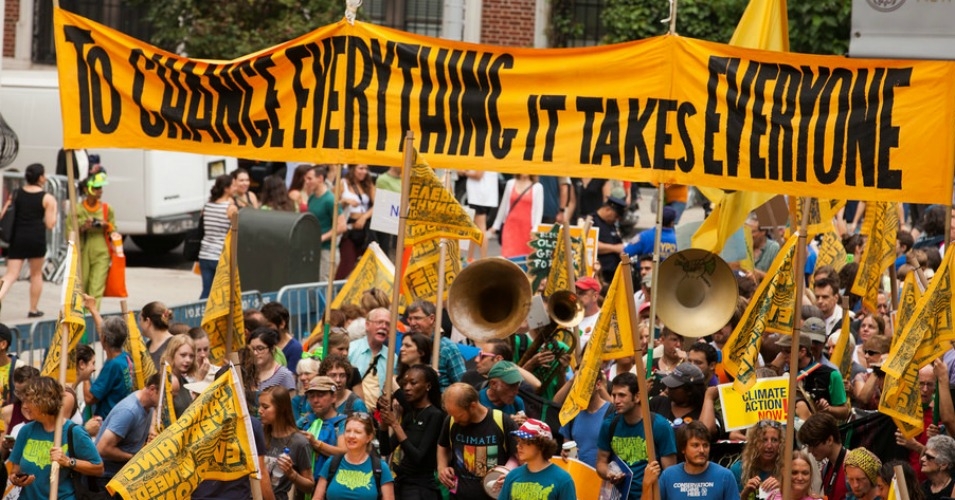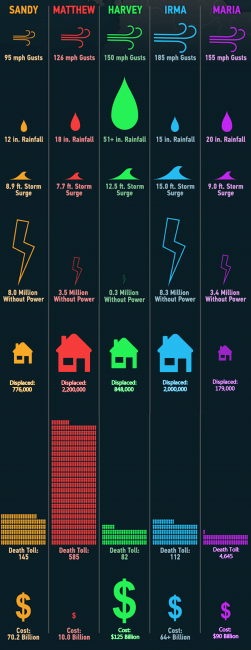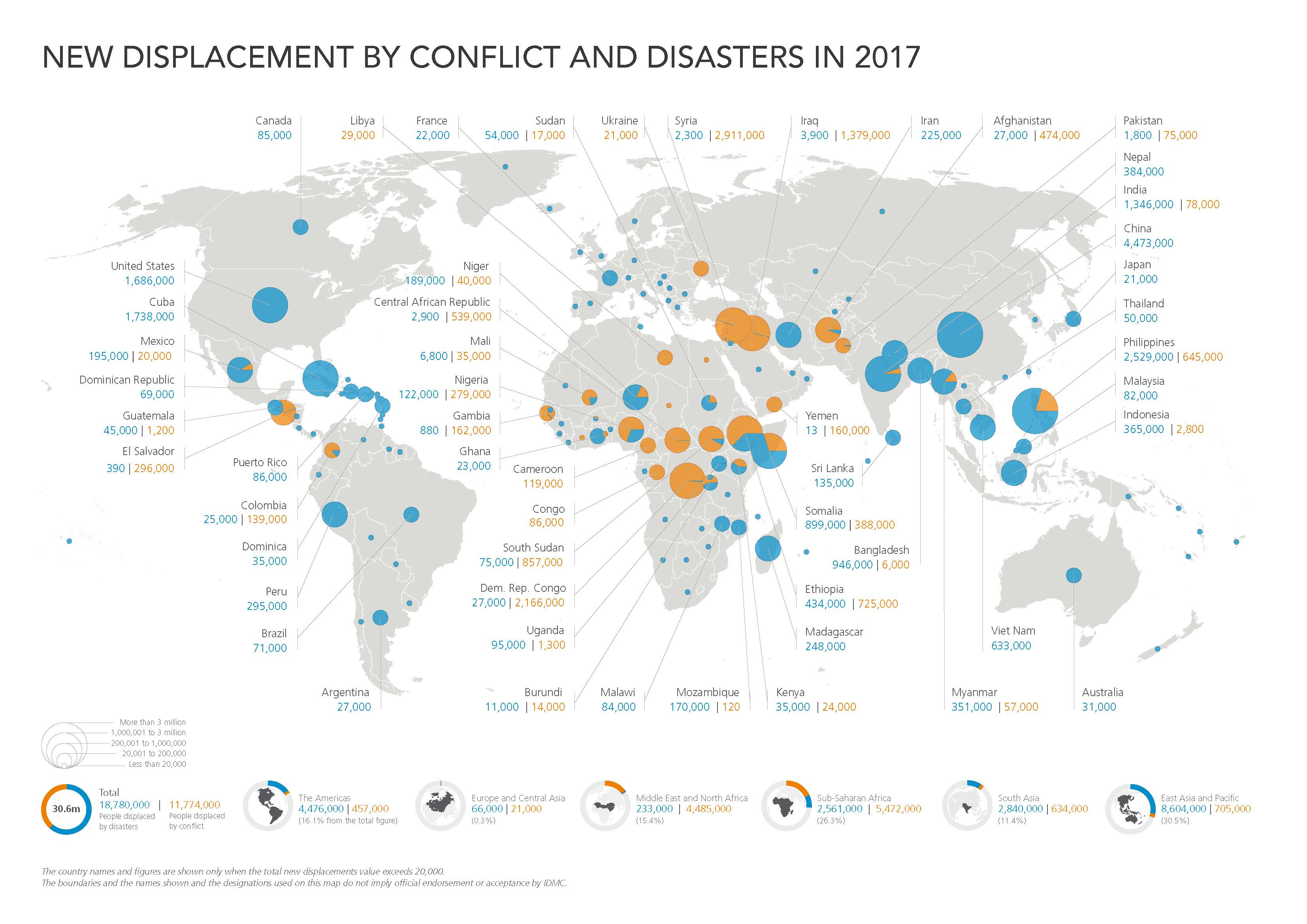The struggles for immigration justice and climate justice are inextricably linked. Their victories exist as a positive feedback loop, each imperative to the other’s success as trials of climate change, displacement, and anti-immigration efforts and violence ensue internationally. Policies that acknowledge the US contribution to climate change and serve those displaced by extreme climatic events must be put forward to ensure that those most impacted by climate-induced displacement are protected and safeguarded.
The issue of climate-induced displacement is a global phenomenon.
In 2017 alone, wildfires that tore through Northern California forced at least 100,000 people to evacuate their homes. Meanwhile North Atlantic hurricanes at the category 4 and 5 levels have increased in both frequency and severity since the 1980s, displacing US residents and leading to socioeconomic turmoil in impacted regions (See Figure 1). Hurricane Maria led to an estimated 4,645 deaths and left hundreds of thousands more in Puerto Rico without power or access to necessary health services, forcing over 179,000 to leave the island for the mainland US. The environmental, social, and economic impacts of these hurricanes have devastated local economies and will continue to make these Atlantic regions risk-heavy environments vulnerable to displacement.
Globally, the UN estimates that between 2008 and 2015, an average 26.4 million people per year were displaced by climate- or weather-related disasters. This is equivalent to one person being displaced every second. Furthermore, experts calculate that by the middle of this century, climate change is likely to displace between 150 million and 300 million people. The relationship between human- and non-human-induced climate change and forced migration and displacement is no longer debatable.
According to reports published by the Internal Displacement Monitoring Center, nearly 213.7 million people across the globe have been internally displaced by weather-related disasters from 2008 to 2017. Of the 30.6 million displacements in 2017, 61 percent were caused by weather-related disasters including floods, storms, droughts, and other-extreme weather events (See Figure 2). A disproportionate amount of those displaced come from the Global South1 whose populations have contributed the least to global climate change and whose governments do not have the resources to adapt to its disastrous effects. As weather patterns continue to shift and extreme storms become more common, these countries become increasingly vulnerable to climate change-induced displacement and an increasingly draconian immigration system of closed borders and anti-immigration policies.
As devastation and displacement continue, those who are most responsible for climate change need to be held accountable to ensure those who have been displaced are aided and protected. The US population accounts for less than five percent of the world’s population, yet is responsible for nearly 25 percent of natural resource consumption, making the country a leading contributor to climate change. Rather than acknowledging its role in the climate change and the global refugee crises, and working towards developing equitable solutions, the US is instead impeding progress and relief on both fronts at the national and international levels.
Currently in the US, 559 migrant children remain separated from their families while being held in government custody, the Trump Administration has withdrawn from the Paris Climate Accord Agreement, and a report form the State Department confirmed that the Trump Administration has capped refugee admissions to 45,000- a historic low by a US president for the past three decades.
At the international level, the US continues to support countries like Honduras whose far-right government has been linked to the paramilitary assassination of climate activist Berta Caceres, yet continues to reject Honduran refugees fleeing persecution. Additionally, hateful and inflammatory discourse towards immigrants deployed by the Trump administration has put immigrants in the US in danger of violence, harassment, and increasing marginalization.
Source: IDMC
Immigration and climate activists are up against an endless array of work to bring justice for the most marginalized of climate change impacts and immigration conflicts.
The United States and other countries within the Global North must take action to bring forward policy and legislation that gives those who have been displaced by climate change fair and equitable rights. To this date, no international protection exists for those who have been displaced by a changing climate or climatic events, and these people continue to be denied the protections of “refugees” at the international level.
A just immigration policy would acknowledge the increasing prevalence of climate refugees, highlight the US contribution to climate-induced displacement, and open borders to refugees who are fleeing from political instability and climate devastation that the US has contributed to. As a start, the 1951 Refugee Convention should account for climate-induced displacement by including “climate refugees” within their legal framework to ensure those displaced by climate change receive international legal rights as refugees.
Activists fighting for immigration justice and climate justice are beginning to recognize that their work is bound to one another, and we must all recognize that when immigration justice or climate justice is pushed forward, the other has a foundation to build on. Together they can catalyze a movement that pushes for a safe, fair, sustainable, and inclusive environment for all.
Evan Yoshimoto is a 2018 Haas Institute Summer Fellow and a recent graduate of UC Berkeley with degrees in Environmental Economics & Policy, and Conservation & Resource Studies. As a summer fellow, Evan works with the Global Justice Program to assess how corporate power influences society and complete case studies on climate refugee displacement across the globe.
Editor's note: The ideas expressed in this blog post are not necessarily those of the Haas Institute or UC Berkeley, but belong to the author.
- 1The Global South refers to the countries that largely make up the Southern Hemisphere and that are imbricated within interconnected histories and relations of US and European colonialism, imperialism, and differential economic and social change through which inequalities in living standards, life expectancy, and access to resources are created and maintained. Nour Dados and Raewyn Connell, “The Global South,” Contexts 11, no. 1 (2012):12–13.







